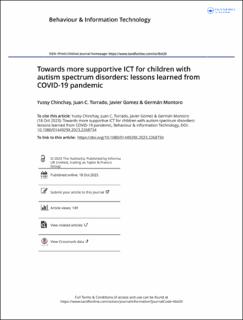Towards more supportive ICT for children with autism spectrum disorders: lessons learned from COVID-19 pandemic
Peer reviewed, Journal article
Published version
Permanent lenke
https://hdl.handle.net/11250/3099601Utgivelsesdato
2023Metadata
Vis full innførselOriginalversjon
Behaviour and Information Technology. 2023, . https://doi.org/10.1080/0144929X.2023.2268734Sammendrag
COVID-19 pandemic has disrupted daily routines, causing isolation and quarantine. Technology
has emerged as a crucial tool for sustaining essential activities, but children with autism
spectrum disorders have faced distinct challenges due to their intricate interaction with it. We
employed an online survey to analyse the impact of technology use in online learning, remote
assistance and daily life of children with autism along COVID-19, and we have identified
benefits and challenges with assistive technology exposed by the pandemic. Findings are
divided in (1) seven themes where COVID-19 impacted this population the most and their
relationship with technology (remote communication, learning, emotional management,
entertainment management, executive functions, activities of daily living, and physical activity
and motor skills), and (2) a mapping of technological categories that define the working areas
specifically aimed to cover the special needs of children with autism whenever face-to-face
interactions are not possible (attention, authoring tools, calculation, e-learning, emotions,
entertainment, experience of self, language and communication, memory, planning and time
management, social networking, and social skills). These results help provide a more well-rounded knowledge of how to improve technology to make it accessible to autistic children, to
handle and avoid services interruption in similar scenarios.

